Publishing Talks: David Wilk interviews Mary Gannon of CLMP
May 30, 2020 by David
Filed under Publishing History, PublishingTalks, The Future
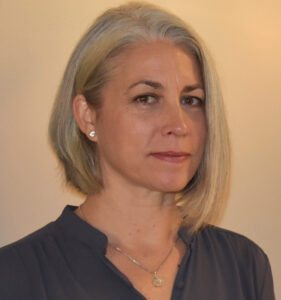 Publishing Talks began as a series of conversations with book industry professionals and others involved in media and technology, mostly talking about the future of publishing, books, and culture. As every media business continues to experience disruption and change, I’ve spent time talking with some of the people involved in our industry about how publishing might evolve as it is affected by technology and the larger context of culture and economics.
Publishing Talks began as a series of conversations with book industry professionals and others involved in media and technology, mostly talking about the future of publishing, books, and culture. As every media business continues to experience disruption and change, I’ve spent time talking with some of the people involved in our industry about how publishing might evolve as it is affected by technology and the larger context of culture and economics.
Some time back, this series broadened to include conversations that go beyond the future of publishing. In an effort to document the literary world, I’ve talked with a variety of editors, publishers and arts professionals who have been innovators and leaders in independent publishing in the past and the present, and continue to explore the ebb and flow of writing, books, and publishing in all sorts of forms and formats, as change continues to be the one constant we can count on.
Mary Gannon is the Executive Director of the Community of Literary Magazines and Presses, a now more than fifty-year-old nonprofit that is the primary organization in the US supporting the literary publishing community. There are hundreds of publications of all sizes that benefit from CLMP’s work, some well-established, others that are start-ups, and many others in various stages of growth and development. Some have institutional support, while the majority are supported only by the work of volunteers and readers.
Mary is herself a poet, and has worked in the literary community for many years. She well understands the struggles and needs of the community she serves. Before joining CLMP in 2018, she was the Associate Director and Director of Content for the Academy of American Poets, and before that she was the Editorial Director of Poets & Writers, the country’s largest nonprofit organization serving poets and literary writers.
Mary has published numerous articles about publishing and the literary field, as well as book reviews in a variety of journals. With her husband, Poets & Writers Magazine Editor-in-Chief Kevin Larimer, she wrote The Poets & Writers Complete Guide to Being a Writer, published by Avid Reader Press/Simon & Schuster April, 2020.
I’ve wanted to talk to Mary for some time about the state of the independent literary community. Now, with the COVID pandemic having such an impact, especially so on the arts (to the point of crisis for many) it’s an important time for a conversation about the current state and future prospects of literary publishing.
CLMP was founded in 1967 by writers and editors, including Russell Banks (whom I interviewed in 2018.) It offers a range of services and funding to magazines and literary publishers. Visit the CLMP website for more information or to make a donation in support of its vital work to support independent literary culture.
Disclosure: I am currently proud to be a member of the board of trustees of CLMP.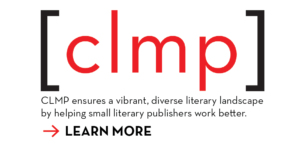
Podcast: Play in new window | Download
David Wilk interviews Russell Banks about Lillabulero magazine
February 4, 2018 by David
Filed under Publishing History, PublishingTalks
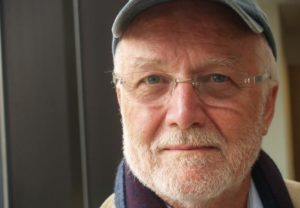 Publishing Talks began as a series of conversations with book industry professionals and others involved in media and technology, mostly talking about the future of publishing, books, and culture. As every media business continues to experience disruption and change, I’ve been talking with some of the people involved in our industry about how publishing might evolve as it is affected by technology and the larger context of culture and economics.
Publishing Talks began as a series of conversations with book industry professionals and others involved in media and technology, mostly talking about the future of publishing, books, and culture. As every media business continues to experience disruption and change, I’ve been talking with some of the people involved in our industry about how publishing might evolve as it is affected by technology and the larger context of culture and economics.
Over the past few years, the series has expanded to include conversations on many other literary and publishing topics. I’ve talked with editors and publishers who have been innovators and leaders in independent publishing in the past and into the present, and will continue to explore the ebb and flow of writing, books, and publishing in all its forms and formats, to help document the breadth and depth of modern literary publishing.
Listeners will most likely know of Russell Banks for his powerfully written and evocative fiction. His novels include The Darling, The Sweet Hereafter, Cloudsplitter, Rule of the Bone, Affliction, Continental Drift, Searching for Survivors, Trailerpark, among others, as well as a collection of short stories, A Permanent Member of the Family.
The prolific Banks has written poems, stories, and essays that have appeared in The Boston Globe Magazine, Vanity Fair, The New York Times Book Review, Esquire, Harper’s and other magazines and journals. His most recent book is the memoir entitled Voyager.
Banks has been widely honored, having won the Ingram Merrill Award, the John Dos Passos Award, the Literature Award from the American Academy of Arts and Letters. Continental Drift and Cloudsplitter were Pulitzer Prize finalists; Affliction, Cloudsplitter and Lost Memory of Skin were PEN/Faulkner Finalists. He is also the founder and president of Cities of Refuge North America.
I think Russell Banks is among the best writers we have. I’ve been moved and challenged by his writing for a very long time. But the main reason I wanted to talk to Russell for this Publishing Talks series is that he was the co-editor of the important literary magazine and press, Lillabulero. With poet Bill Matthews, Russell started publishing Lillabulero when they were students at UNC in Chapel Hill in 1966. That magazine was an important part of the sixties generation of literary magazines and presses, and along with its many peers and competitors helped build a new literary culture that we are still experiencing today.
In those days, mimeographs and a new generation of small offset printing presses, along with inexpensive postal rates, enabled a low cost of entry for writers and editors to reach a wide audience all over the country and to create a new community of readers that were equally hungry for new work as much as the writers themselves sought audiences. Russell and Bill were at the center of much of the creative energy that was circulating around the country at that time, and Lillabulero quickly earned a reputation for quality writing from new writers.
Bill Matthews passed away far too young, and is missed by all those who knew him and his work; I hope this conversation will help bring him wider attention. And it was a great pleasure and honor for me to have this opportunity to speak with Russell about this period in his illustrious literary career.
Bill Matthews’ son, Sebastian, interviewed Russell for the Fiction Writers Review a few years ago, and that interview is a valuable source as well, and the Paris Review interview with Banks is flat out terrific.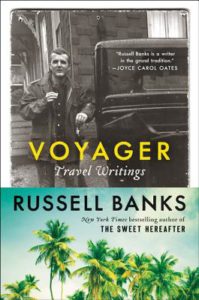
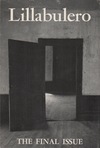
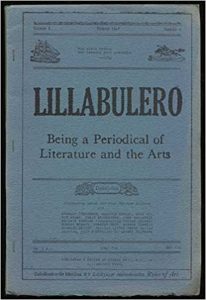
Podcast: Play in new window | Download
David Wilk interviews poet and publisher Bill Mohr
March 24, 2017 by David
Filed under Publishing History, PublishingTalks
 Publishing Talks began as a series of conversations with book industry professionals and others involved in media and technology about the future of publishing, books, and culture. As we continue to experience disruption and change in all media businesses, I’ve been talking with some of the people involved in our industry about how publishing might evolve as our culture is affected by technology and the larger context of civilization and economics.
Publishing Talks began as a series of conversations with book industry professionals and others involved in media and technology about the future of publishing, books, and culture. As we continue to experience disruption and change in all media businesses, I’ve been talking with some of the people involved in our industry about how publishing might evolve as our culture is affected by technology and the larger context of civilization and economics.
I’ve now expanded the series to include conversations that go beyond the future of publishing. I’ve talked with editors and publishers who have been innovators and leaders in independent publishing in the past and into the present, and will continue to explore the ebb and flow of writing, books, and publishing in all sorts of forms and formats, as change continues to be the one constant we can count on.
For the past several years, I’ve been talking to editors and publishers of independent presses about their work, including a number of important literary publishers.
Many years ago, I was introduced to the amazing poetry and writing scene in the Los Angeles area, centered in Venice Beach with the Beyond Baroque Literary Center (which was founded by poet George Drury Smith in 1968) through an old family friend, Alexandra Garrett. Surprisingly to many, Los Angeles has an amazing literary history – there’s much more there than just tinseltown. And of course Charles Bukowski and John Fante lived and worked there, John Martin’s Black Sparrow Press was born in LA, and there have been and now are thriving poetry scenes in various locales throughout the urb over the years. Doug Messerli’s Sun & Moon Press is another notable LA publisher we’ve spoken with.
There were several terrific bookstores in LA in those years, and quite a few great literary magazines and small presses over the years. One of the central individuals in the LA poetry movement of the seventies, eighties and nineties is Bill Mohr, whose magazine and press, Momentum, was a focal point for many writers in and around Los Angeles. Bill and I were friendly in those years but since lost touch, so it was a pleasure to get a chance to talk to him about Momentum for this series of interviews about the independent presses and magazines of the last half century.
Bill was born in Norfolk, Virginia, and grew up there, then moved to Los Angeles to do some acting with various small theater companies, including the Burbage Theater Ensemble. He published and edited Momentum magazine for five years, and then founded Momentum Press in the early 1980s. Between 1975 and 1988, Momentum published about 25 books including Leland Hickman’s Great Slave Lake Suite, which was one of five finalists for the Los Angeles Times book prize in 1980.
Bill also edited two important LA-focused anthologies, The Streets Inside (1978) and Poetry Loves Poetry (1985). During much of this time Bill worked as a blueprint machine operator and a typesetter, and later went to graduate school to start a new career as a scholar and professor. Mohr has been a visiting scholar at the Getty Research Institute in Los Angeles, as well as an Andrew W. Mellon Fellow at the Huntington Library in San Marino, CA. A chapter from his work-in-progress on West Coast poetry during the Cold War was included in The Sons and Daughters of Los: Culture and Community in L.A. (Temple University Press). For over 25 years he has taught creative writing in medium and minimum security prisons in Chino and the University of California, San Diego, and Idyllwild Arts, in Idyllwild, CA.
Bill is now a professor in the Department of English at California State University, Long Beach. He has a Ph.D. in Literature from the University of California, San Diego, and has taught at CSU Long Beach since 2006. His poems, prose poems and creative prose have appeared in dozens of magazines in the past 40 years, including 5 AM, Antioch Review, Beyond Baroque, Blue Collar Review, Blue Mesa Review, Caliban (On-line), Miramar, ONTHEBUS, OR, Santa Monica Review, Skidrow Penthouse, Solo Nolo, Sonora Review, Spot, Upstreet, Wormwood Review, and ZYZZYVA. His volumes of poetry include Hidden Proofs (1982); Penetralia (1984); Bittersweet Kaleidoscope (2006); and a bilingual volume published in Mexico, Pruebas Ocultas (Bonobos Editores, 2015). A CD and cassette release of spoken word was produced by Harvey Robert Kubernik and released by New Alliance Records in 1993.
This conversation was great fun for me, and I hope will be an important addition to the oral history of independent publishing over the last decades.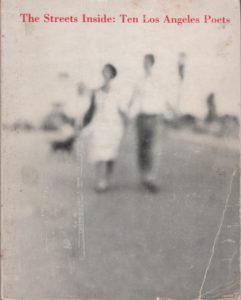
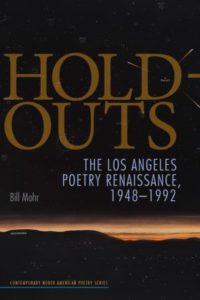
Podcast: Play in new window | Download
David Wilk Interviews Charles Bernstein of L=A=N=G=U=A=G=E Magazine
April 12, 2014 by David
Filed under Publishing History, PublishingTalks
 Publishing Talks began as a series of conversations with book industry professionals and others involved in media and technology about the future of publishing, books, and culture. As we continue to experience disruption and change in all media businesses, I’ve been talking with some of the people involved in our industry about how they believe publishing might evolve as our culture is affected by technology and the ebb and flow of civilization and economics.
Publishing Talks began as a series of conversations with book industry professionals and others involved in media and technology about the future of publishing, books, and culture. As we continue to experience disruption and change in all media businesses, I’ve been talking with some of the people involved in our industry about how they believe publishing might evolve as our culture is affected by technology and the ebb and flow of civilization and economics.
Recently, the series has expanded to include conversations that go beyond the future of publishing. I’ve talked with editors and publishers who have been innovators and leaders in independent publishing in the past and into the present, and will continue to explore the past, present and future of writing, books, and publishing in all sorts of forms and formats, as change continues to be the one constant we can count on.
It’s my hope that these conversations can help us understand the outlines of what is happening in publishing and writing, and how we might ourselves interact with and influence the future of publishing as it unfolds. Some of my latest interviews reflect my interest in the history of independent literary publishing, an area I have been involved in for a very long time.
Charles Bernstein has been a poet, editor, theorist and teacher of poetry and poetics, and is best known as a leader of what has become known as the LANGUAGE school of poetry. Between 1978 and 1981, Charles and poet Bruce Andrews edited the truly extraordinary journal they called L=A=N=G=U=A=G=E, that has become one of the most influential literary magazines of the last half century. That magazine, which circulated a relatively small number of copies during a relatively short period of time (13 issues), helped to establish and define what was then mostly an outsider and alternative challenge to contemporary poetry and thinking about reading poetry and which has now become a fixture in modern poetry and poetics. All the issues of the magazine are available online here.
Since that time, Charles has taught and continued to help establish influential organizations. He was the David Gray Professor of Poetry and Letters at the SUNY Buffalo and Director of the Poetics Program, which he co-founded with poet Robert Creeley. At SUNY, he co-founded the Electronic Poetry Center and is currently the Donald T. Regan Professor of English and Comparative Literature at the University Pennsylvania. He also is a co-founder of the outstanding and wonderful poetry audio archive at UPenn called PennSound (there’s a Writerscast interview with Charles, Al Filreis and Michael Hennessey here).
Our conversation about L=A=N=G=U=A=G=E continues my effort to document at least a small portion of the creative work of independent literary publishing of the late 20th century, that has been so important to the development of contemporary literary culture.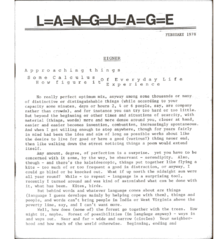
The anthology mentioned in the talk, The L=A=N=G=U=A=G=E Book (Poetics of the New), was published by Southern Illinois University Press, and is in print and available.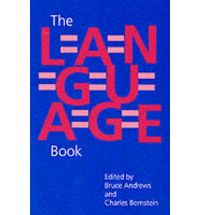 Note to listeners: as with all these historically based conversations about literary publishing, this is a relatively long listen, at about 48 minutes.
Note to listeners: as with all these historically based conversations about literary publishing, this is a relatively long listen, at about 48 minutes.
Podcast: Play in new window | Download
